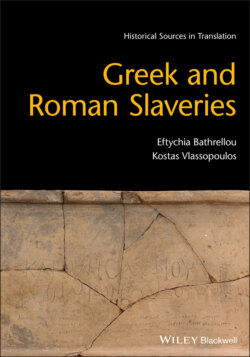Читать книгу Greek and Roman Slaveries - Eftychia Bathrellou - Страница 29
1.18 P.Turner 41, 1–20: Papyrus with Petition in Greek, Oxyrhynchos, Egypt (Mid-Third Century CE)
ОглавлениеLiterature: Llewelyn 1992: 55–60, 1997: 9–46.
Aurelia Sarapias, also called Dionysarion, daughter of Apollophanes, also called Sarapammon, formerly exegêtês of Antinoopolis, acting without a guardian, in accordance with the ius liberorum.19 I own a slave, formerly my father’s, Sarapion by name, who I thought would commit no wrongdoing because he was part of my patrimony and had been entrusted by me with our affairs. This man, I don’t know how, at the instigation of others, adopted an enemy’s attitude toward the honor and the provision of the necessities for life I was giving him. He stealthily took from our household some clothes I had prepared for him and some other stuff, which he helped himself to from our belongings, and secretly ran away. When it came to my ears that he was at Chairemon’s, in the hamlet of Nomou, I requested […].
What are the names of the mistress and the slave? Can we draw any conclusions from this?
How is Sarapion described?
Why did Sarapias not expect him to betray her and flee?
Why does Sarapias think that Sarapion was ungrateful? What did she offer her slave?
What do you think of the employment of the term honor in this context?
How does Sarapias explain Sarapion’s change of behavior? How credible do you find her explanation? What other explanations can you think of?
What can we learn about “the mind of the master class” from this petition?
